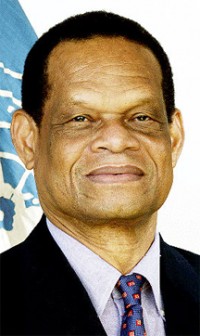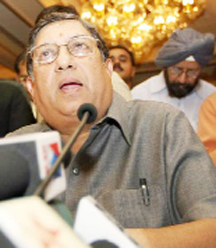It is indeed commendable that the International Cricket Council (ICC), the world governing body for cricket, has recognized that all is not well with its governance of the sport and as a result set up a commission to look at its present structure. Not many international federations are willing to do that.
The Independence Governance Review, or the “Woolf Report” as it is known, has come up with some 65 recommendations aimed at improving the governance of cricket.
The Woolf Report aims to revamp the ICC, especially its top decision making body, its executive board.
The ICC has a curious structure. There are the test playing countries and then there are the also rans, or the Affiliate and Associate Members.
It is the former body that the Woolf Report has targeted.
 Mindful of the influence of the bigger Test playing countries and their sway, or say in the decision making process of the ICC, the Woolf Report has suggested a restructuring of the executive committee of the ICC.
Mindful of the influence of the bigger Test playing countries and their sway, or say in the decision making process of the ICC, the Woolf Report has suggested a restructuring of the executive committee of the ICC.
There have been complaints that the ICC seems to pander to the influence of countries such as India, Australia and to a lesser extent England which apparently is the rationale behind the Woolf Report seeking to diminish the powers of the executive body.
How is it going to do this?
The Woolf Report has suggested a reduction in representative members
of Full Member countries and to bring in independent directors to reduce their influence.
“The ICC reacts as though it is primarily a Members club,” states the Woolf Report.
It is a criticism that is not altogether farfetched.
Another of the Woolf’s Report recommendations, is that the ICC
do away with its present three-tier structure of Test Playing Nations, Affiliate and Associate members and simply have two membership classes namely Full Members and Associates.

While the Woolf Report is yet to be addressed by the ICC, which plans to do so in April, the release of the report has had mixed reviews.
According to Cricket Australia’s Chief Executive James Sutherland, it would be foolish of the ICC to reject the Woolf Report as it contains some practical suggestions on the governance of the sport.
Not surprisingly, the Board of Control for Cricket in India (BCCI), at present one of cricket’s superpowers and controllers of the lucrative Indian Premier League does not agree and has expressed reservations.
So too has the England and Wales Cricket Board.
BCCI president N Srinivasan told a press conference recently that the working committee of the board had rejected the main recommendations made by the Woolf committee.
“The working committee discussed all the main recommendations of the report submitted to the ICC by a committee headed by Lord Woolf. The working committee was of the opinion that these recommendations were not acceptable and rejected it,” Srinivasan said.

“The working committee was in particular not agreeable to the changes in the structure of the management of ICC that had been proposed,” he said.
Srinivasan, however, did not specify which of the several recommendations of the Woolf report the BCCI was opposed to.
The West Indies Cricket Board, best by its own problems is yet to make a definitive statement on the report though its rival, the West Indies Players’ Association, ever anxious to show up the WICB has urged the regional governing body to adopt some of the reports crucuial recommendations – a move designed to make the WICB do the exact opposite.
The WICB did commission its own report a few years ago.
Like the Woolf Report, the Patterson Committee Report sought to reduce the powers of those in charge of the sport and called for the establishment of a two-tiered body called a Cricket West Indies Council that would sit above the West Indies Cricket Board.
The Cricket West Indies Council was to be comprised of numerous stakeholders and special interests and the Patterson report also wanted a reduction in the number of directors representing each territory to one from its present two.

Not surpringly, those recommendations by the Patterson Committee have not yet been implemented although WICB president Julian Hunte is on record as stating that some 47 of the 65 recommendations of the Patterson Report have been implemented.
Small wonder that the game in the Caribbean now faces the threat of government intervention in Guyana and Jamaica.
The Guyana government has implemented an Interim Management Committee tasked with the responsibility of rewriting the constitution of the GCB a move that the WICB is not altogether happy with.
Earlier this week, Jamaica’s Prime Minister Portia Miller Sampson, added her voice to the continued exclusion of Chris Gayle from the West Indies senior team and the Jamaican Cricket Association, forced by the WICB to take sides on the matter, batted for the Prime Minister in what is another embarrassing issue for the WICB.
As far as reports go, there seems to be very little will in adopting the recommendations inherent in these type of reports especially recommendations which seek to reduce the powers and authority of those in charge. The Old Boys Club is not yet ready to change its modus operandi and include the ordinary rank and file member.
It therefore seems unlikely that come April, the ICC will rule in favour of implementing the sweeping changes in the administration of cricket and the functioning of its governing body as recommended by the Woolf report.
The Woolf report, like other reports of its kind seem destined for the dustbin.








